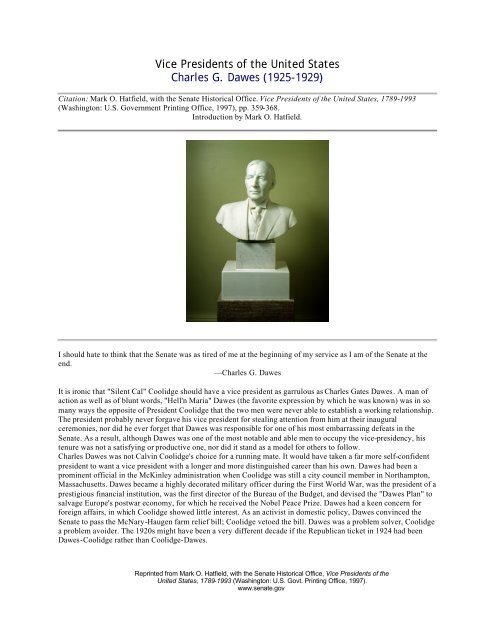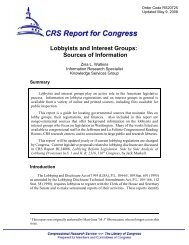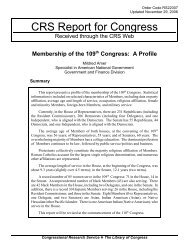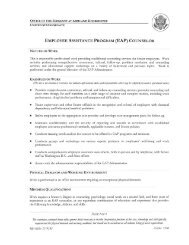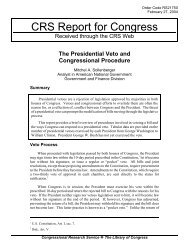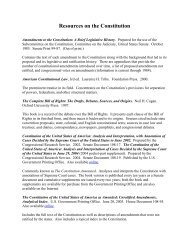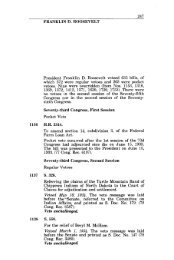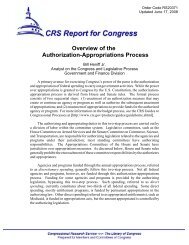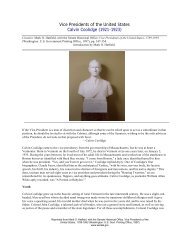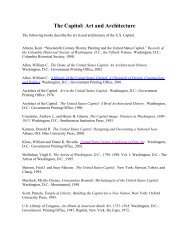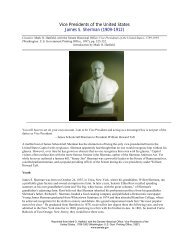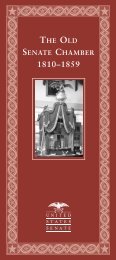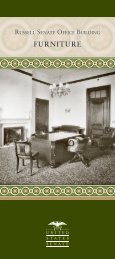Vice Presidents of the United States Charles G. Dawes ... - U.S. Senate
Vice Presidents of the United States Charles G. Dawes ... - U.S. Senate
Vice Presidents of the United States Charles G. Dawes ... - U.S. Senate
Create successful ePaper yourself
Turn your PDF publications into a flip-book with our unique Google optimized e-Paper software.
<strong>Vice</strong> <strong>Presidents</strong> <strong>of</strong> <strong>the</strong> <strong>United</strong> <strong>States</strong><br />
<strong>Charles</strong> G. <strong>Dawes</strong> (1925-1929)<br />
Citation: Mark O. Hatfield, with <strong>the</strong> <strong>Senate</strong> Historical Office. <strong>Vice</strong> <strong>Presidents</strong> <strong>of</strong> <strong>the</strong> <strong>United</strong> <strong>States</strong>, 1789-1993<br />
(Washington: U.S. Government Printing Office, 1997), pp. 359-368.<br />
Introduction by Mark O. Hatfield.<br />
I should hate to think that <strong>the</strong> <strong>Senate</strong> was as tired <strong>of</strong> me at <strong>the</strong> beginning <strong>of</strong> my service as I am <strong>of</strong> <strong>the</strong> <strong>Senate</strong> at <strong>the</strong><br />
end.<br />
—<strong>Charles</strong> G. <strong>Dawes</strong><br />
It is ironic that "Silent Cal" Coolidge should have a vice president as garrulous as <strong>Charles</strong> Gates <strong>Dawes</strong>. A man <strong>of</strong><br />
action as well as <strong>of</strong> blunt words, "Hell'n Maria" <strong>Dawes</strong> (<strong>the</strong> favorite expression by which he was known) was in so<br />
many ways <strong>the</strong> opposite <strong>of</strong> President Coolidge that <strong>the</strong> two men were never able to establish a working relationship.<br />
The president probably never forgave his vice president for stealing attention from him at <strong>the</strong>ir inaugural<br />
ceremonies, nor did he ever forget that <strong>Dawes</strong> was responsible for one <strong>of</strong> his most embarrassing defeats in <strong>the</strong><br />
<strong>Senate</strong>. As a result, although <strong>Dawes</strong> was one <strong>of</strong> <strong>the</strong> most notable and able men to occupy <strong>the</strong> vice-presidency, his<br />
tenure was not a satisfying or productive one, nor did it stand as a model for o<strong>the</strong>rs to follow.<br />
<strong>Charles</strong> <strong>Dawes</strong> was not Calvin Coolidge's choice for a running mate. It would have taken a far more self-confident<br />
president to want a vice president with a longer and more distinguished career than his own. <strong>Dawes</strong> had been a<br />
prominent <strong>of</strong>ficial in <strong>the</strong> McKinley administration when Coolidge was still a city council member in Northampton,<br />
Massachusetts. <strong>Dawes</strong> became a highly decorated military <strong>of</strong>ficer during <strong>the</strong> First World War, was <strong>the</strong> president <strong>of</strong> a<br />
prestigious financial institution, was <strong>the</strong> first director <strong>of</strong> <strong>the</strong> Bureau <strong>of</strong> <strong>the</strong> Budget, and devised <strong>the</strong> "<strong>Dawes</strong> Plan" to<br />
salvage Europe's postwar economy, for which he received <strong>the</strong> Nobel Peace Prize. <strong>Dawes</strong> had a keen concern for<br />
foreign affairs, in which Coolidge showed little interest. As an activist in domestic policy, <strong>Dawes</strong> convinced <strong>the</strong><br />
<strong>Senate</strong> to pass <strong>the</strong> McNary-Haugen farm relief bill; Coolidge vetoed <strong>the</strong> bill. <strong>Dawes</strong> was a problem solver, Coolidge<br />
a problem avoider. The 1920s might have been a very different decade if <strong>the</strong> Republican ticket in 1924 had been<br />
<strong>Dawes</strong>-Coolidge ra<strong>the</strong>r than Coolidge-<strong>Dawes</strong>.<br />
Reprinted from Mark O. Hatfield, with <strong>the</strong> <strong>Senate</strong> Historical Office, <strong>Vice</strong> <strong>Presidents</strong> <strong>of</strong> <strong>the</strong><br />
<strong>United</strong> <strong>States</strong>, 1789-1993 (Washington: U.S. Govt. Printing Office, 1997).<br />
www.senate.gov
Banking, Business and Politics<br />
Born in Marietta, Ohio, on August 27, 1865, <strong>Charles</strong> <strong>Dawes</strong> was <strong>the</strong> great-great grandson <strong>of</strong> William <strong>Dawes</strong>, who<br />
had ridden with Paul Revere to warn <strong>the</strong> colonists that <strong>the</strong> Redcoats were coming. <strong>Dawes</strong>' fa<strong>the</strong>r, Rufus <strong>Dawes</strong>, was<br />
a Civil War veteran and lumber merchant who served as a Republican for one term in <strong>the</strong> U.S. House <strong>of</strong><br />
Representatives. Young Charlie, who even as a boy had a reputation for "flying <strong>of</strong>f <strong>the</strong> handle" when something<br />
angered him, attended <strong>the</strong> Marietta Academy in Ohio and graduated from Marietta College in 1884. Two years later<br />
he received his law degree from <strong>the</strong> Cincinnati Law School. While in law school he worked during <strong>the</strong> summers as a<br />
civil engineer for <strong>the</strong> Marietta, Columbus & Nor<strong>the</strong>rn Ohio Railway Company. 1<br />
In 1887, former Ohio Governor Rufus Walton hired <strong>Dawes</strong> to go to Lincoln, Nebraska, and look after his real estate<br />
holdings. <strong>Dawes</strong> was admitted to <strong>the</strong> bar in Nebraska and opened <strong>the</strong> law <strong>of</strong>fice <strong>of</strong> <strong>Dawes</strong>, C<strong>of</strong>froth & Cunningham.<br />
He established a reputation for handling railroad rate cases under <strong>the</strong> Interstate Commerce Act <strong>of</strong> 1887 and as a<br />
"people's advocate against <strong>the</strong> railroad lobby." The same year that <strong>Dawes</strong> opened his law <strong>of</strong>fice, William Jennings<br />
Bryan started his law practice in <strong>the</strong> same building in Lincoln. <strong>Dawes</strong>, who was <strong>the</strong>n twenty-two, and Bryan, who<br />
was twenty-seven, attended Sunday services and Wednesday night prayer meetings at <strong>the</strong> same Presbyterian church<br />
and even lived two houses apart on <strong>the</strong> same street. As a consequence, <strong>the</strong> two men, from different parties and with<br />
very different views on <strong>the</strong> issues, had many opportunities to meet and debate politics. (In 1924, <strong>Dawes</strong> would run<br />
for vice president against Bryan's bro<strong>the</strong>r <strong>Charles</strong>, <strong>the</strong> Democratic vice-presidential candidate.) <strong>Dawes</strong> became<br />
director <strong>of</strong> <strong>the</strong> American Exchange National Bank, a small bank in Lincoln, which he and o<strong>the</strong>r directors fought<br />
hard to save during <strong>the</strong> panic <strong>of</strong> 1893. As a bank director, he strongly disagreed with Bryan's advocacy <strong>of</strong> free silver<br />
to stimulate inflation and help <strong>the</strong> indebted farmers. <strong>Dawes</strong> became so engrossed in <strong>the</strong> currency issue that he<br />
published his first book, The Banking System <strong>of</strong> <strong>the</strong> <strong>United</strong> <strong>States</strong> and Its Relation to <strong>the</strong> Money and Business <strong>of</strong> <strong>the</strong><br />
Country, in 1894. 2<br />
"I struck Lincoln right at <strong>the</strong> top <strong>of</strong> a boom," <strong>Dawes</strong> noted, "<strong>the</strong>n it started sliding." The panic <strong>of</strong> 1893 had<br />
undermined his business and banking career in Lincoln, sending him in search <strong>of</strong> new business ventures elsewhere.<br />
Attracted by <strong>the</strong> utilities industry, he bought control <strong>of</strong> <strong>the</strong> La Crosse, Wisconsin, Gas Light & Coke Company, and<br />
became president <strong>of</strong> <strong>the</strong> People's Gas Light & Coke Company <strong>of</strong> Chicago. In January 1895, he moved his family to<br />
Chicago to make that city <strong>the</strong> center <strong>of</strong> his business interests. But within two weeks he met <strong>the</strong> Cleveland<br />
industrialist Marcus A. Hanna, who was promoting <strong>the</strong> presidential aspirations <strong>of</strong> Ohio Governor William<br />
McKinley. Writing in his diary that "McKinley seems to be <strong>the</strong> coming man," <strong>Dawes</strong> was bitten by <strong>the</strong> political bug.<br />
He managed McKinley's preconvention campaign in Illinois, winning that state's delegates away from <strong>the</strong> erstwhile<br />
"favorite son" candidate, Senator Shelby M. Cullom. Not only did McKinley win <strong>the</strong> Republican nomination, but<br />
<strong>Dawes</strong>' old friend William Jennings Bryan won <strong>the</strong> Democratic nomination. While <strong>Dawes</strong> disagreed pr<strong>of</strong>oundly<br />
with <strong>the</strong> logic <strong>of</strong> free silver, he listened to Bryan's "Cross <strong>of</strong> Gold" speech with a feeling <strong>of</strong> great pride "for <strong>the</strong><br />
brilliant young man whose life for so many years lay parallel to mine, and with whom <strong>the</strong> future years may yet bring<br />
me into conflict as in <strong>the</strong> past." 3<br />
Comptroller <strong>of</strong> <strong>the</strong> Currency<br />
Mark Hanna put <strong>Dawes</strong> in charge <strong>of</strong> <strong>the</strong> Chicago headquarters, which largely ran <strong>the</strong> McKinley campaign. <strong>Dawes</strong><br />
also served on <strong>the</strong> Republican National Executive Committee as McKinley's "special representative." McKinley's<br />
victory led to <strong>Dawes</strong>' appointment as comptroller <strong>of</strong> <strong>the</strong> currency, a post in which he sought to reform banking<br />
practices that had led to <strong>the</strong> depression <strong>of</strong> <strong>the</strong> 1890s. McKinley treated <strong>Dawes</strong> "as a fa<strong>the</strong>r would a son." <strong>Dawes</strong><br />
frequently had lunch at <strong>the</strong> White House with McKinley and his invalid wife Ida and returned for an evening <strong>of</strong><br />
cards or <strong>of</strong> playing <strong>the</strong> piano for <strong>the</strong> McKinleys' entertainment. (A self-taught pianist, <strong>Dawes</strong> later wrote a popular<br />
piano piece, "Melody in A Major," and when lyrics were added in 1951 it became <strong>the</strong> well-known song "It's All in<br />
<strong>the</strong> Name <strong>of</strong> <strong>the</strong> Game.") More than a companion to <strong>the</strong> president, <strong>Dawes</strong> was a trusted adviser. In 1900 when Mark<br />
Hanna tried to block <strong>the</strong> vice-presidential nomination <strong>of</strong> New York Governor Theodore Roosevelt, it was <strong>Dawes</strong><br />
who intervened with McKinley on Roosevelt's behalf. 4<br />
Reprinted from Mark O. Hatfield, with <strong>the</strong> <strong>Senate</strong> Historical Office, <strong>Vice</strong> <strong>Presidents</strong> <strong>of</strong> <strong>the</strong><br />
<strong>United</strong> <strong>States</strong>, 1789-1993 (Washington: U.S. Govt. Printing Office, 1997).<br />
www.senate.gov
In June 1901, <strong>Dawes</strong> decided to resign as comptroller <strong>of</strong> <strong>the</strong> currency to return to Illinois and run for <strong>the</strong> <strong>Senate</strong>. He<br />
was assured <strong>of</strong> McKinley's endorsement, but his resignation did not take place until October, a month after<br />
McKinley's assassination. <strong>Dawes</strong>' political ambitions were thwarted by new President Theodore Roosevelt, who<br />
endorsed ano<strong>the</strong>r candidate, and by <strong>the</strong> "blond boss" <strong>of</strong> <strong>the</strong> Illinois Republican party, William Lorimer. Running for<br />
vice president in 1924 and reflecting on his only o<strong>the</strong>r run for elected <strong>of</strong>fice in 1901, <strong>Dawes</strong> remarked: "I don't know<br />
anything about politics. I thought I knew something about politics once. I was taken up on <strong>the</strong> top <strong>of</strong> a twenty story<br />
building and showed <strong>the</strong> promised land—and <strong>the</strong>n I was kicked <strong>of</strong>f." 5<br />
A day after losing <strong>the</strong> <strong>Senate</strong> nomination, <strong>the</strong> thirty-six-year-old <strong>Dawes</strong> began to organize <strong>the</strong> Central Trust<br />
Company <strong>of</strong> Illinois. He became its president and devoted his attentions to banking and to family life until <strong>the</strong> First<br />
World War. <strong>Dawes</strong> had married Caro Blymyer in 1889. They had two children and later adopted two more. In <strong>the</strong><br />
late summer <strong>of</strong> 1912, <strong>Dawes</strong> suffered <strong>the</strong> greatest tragedy <strong>of</strong> his life when his only son drowned at Lake Geneva,<br />
Wisconsin, while on a brief vacation before returning to Princeton University. Deeply saddened, <strong>Dawes</strong> and his wife<br />
withdrew from most social life and turned to philanthropy. In memory <strong>of</strong> <strong>the</strong>ir son, <strong>the</strong>y founded <strong>the</strong> Rufus Fearing<br />
<strong>Dawes</strong> Hotel for Destitute Men in Chicago and Boston, and later established <strong>the</strong> Mary <strong>Dawes</strong> Hotel for Women in<br />
honor <strong>of</strong> <strong>Dawes</strong>' mo<strong>the</strong>r. 6<br />
Supplying <strong>the</strong> War in Europe<br />
When <strong>the</strong> <strong>United</strong> <strong>States</strong> entered <strong>the</strong> First World War in 1917, <strong>Dawes</strong> received a telegram from Herbert Hoover, who<br />
had organized American relief efforts in Europe and was now serving as Food Administrator. Searching for talented<br />
administrators, Hoover wanted <strong>Dawes</strong> to take charge <strong>of</strong> grain prices. But instead <strong>of</strong> a desk job in Washington,<br />
<strong>Dawes</strong> longed to be in uniform. Hoover considered that a mistake. "I can find a hundred men who will make better<br />
lieutenant colonels <strong>of</strong> engineers, and I want you right here," he argued. "No, Mr. Hoover, I don't want to consider<br />
it," <strong>Dawes</strong> replied. A few days later, <strong>Dawes</strong> at age fifty-two received his commission as a major in <strong>the</strong> 17th Railway<br />
Engineers, bound for France, and, just as Hoover predicted, he was soon a lieutenant colonel. 7<br />
The American Expeditionary Force (AEF) was commanded by General John J. Pershing, who had known <strong>Dawes</strong><br />
since <strong>the</strong> 1890s when Pershing was a military instructor at <strong>the</strong> University <strong>of</strong> Nebraska in Lincoln. In August 1917,<br />
Pershing summoned <strong>Dawes</strong> to Paris and made him chief <strong>of</strong> supply procurement for <strong>the</strong> American forces in Europe,<br />
assigning him to head <strong>the</strong> board that collected supplies and to coordinate purchases to hold down inflation and<br />
duplication <strong>of</strong> orders. <strong>Dawes</strong> rose to <strong>the</strong> rank <strong>of</strong> brigadier general. When <strong>the</strong> Allied command was unified, General<br />
<strong>Dawes</strong> became <strong>the</strong> U.S. member <strong>of</strong> <strong>the</strong> Military Board <strong>of</strong> Allied Supply. While representing <strong>the</strong> <strong>United</strong> <strong>States</strong> Army<br />
in conferences with o<strong>the</strong>r Allied armies and governments, <strong>Dawes</strong> particularly admired men <strong>of</strong> action ra<strong>the</strong>r than<br />
those who simply talked. "Action, <strong>the</strong>n, is everything—words nothing except as <strong>the</strong>y lead immediately to it," he<br />
commented, adding, "I came out <strong>of</strong> <strong>the</strong> war a postgraduate in emergency conferences." 8 After <strong>the</strong> Armistice in 1918,<br />
he remained in Europe to oversee <strong>the</strong> disposition <strong>of</strong> surplus military property. In 1919 he resigned his commission<br />
and returned to <strong>the</strong> <strong>United</strong> <strong>States</strong>. His wartime experiences in negotiating and coordinating efforts with his Allied<br />
counterparts left him an internationalist in outlook, advocating ratification <strong>of</strong> <strong>the</strong> Treaty <strong>of</strong> Versailles and <strong>United</strong><br />
<strong>States</strong> membership in <strong>the</strong> League <strong>of</strong> Nations. After <strong>the</strong> war, everyone called him "General <strong>Dawes</strong>," despite his<br />
protests to <strong>the</strong> contrary. 9<br />
In 1920 <strong>Dawes</strong> supported his good friend, Illinois Governor Frank Lowden, for <strong>the</strong> Republican presidential<br />
nomination, but that prize went to Ohio's Warren G. Harding. In February 1921, however, an event occurred that<br />
brought <strong>Dawes</strong> to <strong>the</strong> attention not only <strong>of</strong> president-elect Harding but <strong>of</strong> <strong>the</strong> entire nation. A House <strong>of</strong><br />
Representatives committee to investigate war expenditures called <strong>Dawes</strong> to testify. Republicans—who held <strong>the</strong><br />
majority—were clearly eager to uncover any information about "extravagant purchases" in <strong>the</strong> AEF that might<br />
tarnish <strong>the</strong> outgoing administration <strong>of</strong> Woodrow Wilson. Journalist Bascom Timmons recorded that <strong>Dawes</strong>, a busy<br />
man, had resented being called by <strong>the</strong> committee. On <strong>the</strong> morning that he was due to testify, he walked around <strong>the</strong><br />
Capitol waiting for <strong>the</strong> committee to assemble, getting angrier all <strong>the</strong> time. It took only a spark to set him <strong>of</strong>f. In <strong>the</strong><br />
course <strong>of</strong> <strong>the</strong> interrogation, Representative Oscar Bland, an Indiana Republican, pressed <strong>Dawes</strong> on how much <strong>the</strong><br />
American army had paid for French horses. 10<br />
Reprinted from Mark O. Hatfield, with <strong>the</strong> <strong>Senate</strong> Historical Office, <strong>Vice</strong> <strong>Presidents</strong> <strong>of</strong> <strong>the</strong><br />
<strong>United</strong> <strong>States</strong>, 1789-1993 (Washington: U.S. Govt. Printing Office, 1997).<br />
www.senate.gov
"Hell'n Maria!" <strong>Dawes</strong> exclaimed, jumping up from his seat and striding to <strong>the</strong> mahogany table where <strong>the</strong> committee<br />
sat. "I will tell you this, that we would have paid horse prices for sheep, if <strong>the</strong>y could have hauled artillery!"<br />
Peppering his remarks with pr<strong>of</strong>anity, <strong>Dawes</strong> lectured <strong>the</strong> committee on <strong>the</strong> urgency <strong>of</strong> getting supplies to soldiers<br />
who were being shot at. He recounted how he had cut through <strong>the</strong> red tape and "had to connive with <strong>the</strong> smuggling<br />
<strong>of</strong> horses over <strong>the</strong>re," but he got <strong>the</strong> horses to drag <strong>the</strong> cannon to <strong>the</strong> front. Turning <strong>the</strong> fire on "pinhead" politicians,<br />
<strong>Dawes</strong> roared: "Your committee can not put a fly speck on <strong>the</strong> American Army. . . . I am against that peanut politics.<br />
This was not a Republican war, nor was it a Democratic war. It was an American war." 11<br />
Afterwards, <strong>Dawes</strong> explained that he had "suddenly decided that so far as I could bring it about ei<strong>the</strong>r <strong>the</strong><br />
Committee or I would go out <strong>of</strong> business." His "Hell 'n Maria" testimony took up seven hours for three sessions <strong>of</strong><br />
<strong>the</strong> committee, with <strong>the</strong> <strong>of</strong>ficial stenographers complaining that he <strong>of</strong>ten spoke too rapidly. <strong>Dawes</strong>' defense <strong>of</strong> <strong>the</strong><br />
AEF won great praise from both parties. The newspapers, and especially <strong>the</strong> editorial cartoonists, loved <strong>Dawes</strong>'<br />
indignant outburst and quaint expletive. His published testimony, even with <strong>the</strong> expletives deleted, became a<br />
Government Printing Office best seller. The incident made him a national figure, and in July 1921, when Congress<br />
created <strong>the</strong> Bureau <strong>of</strong> <strong>the</strong> Budget, Harding appointed <strong>Dawes</strong> as its first director. Adding to his colorful personality,<br />
<strong>Dawes</strong> at this time adopted his trademark pipe. For years he had smoked as many as twenty cigars a day, but during<br />
<strong>the</strong> war a British <strong>of</strong>ficer had given him a pipe. Soon after his appointment to <strong>the</strong> Bureau <strong>of</strong> <strong>the</strong> Budget, a newspaper<br />
photograph showed him smoking his pipe on <strong>the</strong> Treasury Department steps. A Chicago pipe manufacturer sent him<br />
a new, strangely shaped pipe with most <strong>of</strong> its bowl below ra<strong>the</strong>r than above <strong>the</strong> stem. <strong>Dawes</strong> tried it, liked it, and<br />
ordered a gross more. From <strong>the</strong>n on, he was rarely seen without this distinctive pipe, which toge<strong>the</strong>r with his wingtip<br />
collars and hair parted down <strong>the</strong> middle, reinforced his individualistic, iconoclastic, and idiosyncratic public<br />
image. 12<br />
The Nobel Peace Prize<br />
After spending a year setting up <strong>the</strong> first federal budget under <strong>the</strong> new act, <strong>Dawes</strong> returned to Illinois, concerned<br />
about graft and political corruption, especially in Chicago. He organized "The Minute Men <strong>of</strong> <strong>the</strong> Constitution," to<br />
watch elections and prevent vote fraud. The group opposed <strong>the</strong> political activities <strong>of</strong> <strong>the</strong> Ku Klux Klan, and it also<br />
assailed what it considered to be unfair labor union practices. <strong>Dawes</strong> insisted that his group was not anti-union, but<br />
that it opposed <strong>the</strong> closed union shop. At one point <strong>the</strong> "Minute Men" had a membership <strong>of</strong> 25,000, but after his<br />
election as vice president <strong>the</strong> group disbanded.<br />
In 1923, <strong>the</strong> economy <strong>of</strong> Germany had deteriorated drastically. Since Germany was unable to repay its war debts,<br />
France sent troops to occupy <strong>the</strong> industrial Ruhr valley. President Harding appointed <strong>Dawes</strong> to head a commission<br />
to study and solve <strong>the</strong> German financial problem. The "<strong>Dawes</strong> Plan" <strong>of</strong>fered ways to stabilize <strong>the</strong> German currency,<br />
balance its budget, and reorganize its Reichbank, but <strong>the</strong> plan postponed action on <strong>the</strong> most difficult issue <strong>of</strong><br />
delaying and reducing <strong>the</strong> German war reparations. Never<strong>the</strong>less, <strong>the</strong> "<strong>Dawes</strong> Plan" was recognized as a significant<br />
enough contribution to world peace to win <strong>Dawes</strong> <strong>the</strong> 1925 Nobel Peace Prize, which he shared with his British<br />
counterpart, Sir Austen Chamberlain. <strong>Dawes</strong> donated his share <strong>of</strong> <strong>the</strong> prize money to <strong>the</strong> Walter Hines Page School<br />
<strong>of</strong> International Relations at Johns Hopkins University.<br />
The Second Choice for <strong>the</strong> Second Spot<br />
At <strong>the</strong> Republican convention in 1924, Calvin Coolidge was nominated without significant opposition, but <strong>the</strong> frontrunning<br />
candidate for vice president, Governor Lowden, had let it be known that he did not want <strong>the</strong> second spot on<br />
<strong>the</strong> ticket. Nor did <strong>the</strong> popular Idaho Senator William E. Borah want to be <strong>the</strong> number two man. A story at <strong>the</strong> time<br />
recorded that President Coolidge had <strong>of</strong>fered Borah a place on <strong>the</strong> ticket. "For which position?" Borah had<br />
supposedly replied. On <strong>the</strong> second ballot, <strong>the</strong> delegates nominated Lowden, but he declined to run, as threatened.<br />
Republican National Chairman William Butler promoted Commerce Secretary Herbert Hoover, but Hoover<br />
remained too unpopular with <strong>the</strong> farm states for his price fixing as food commissioner during <strong>the</strong> war, and <strong>the</strong><br />
delegates on <strong>the</strong> third ballot chose <strong>Charles</strong> G. <strong>Dawes</strong> for vice president. President Coolidge, who had already sent a<br />
congratulatory note to Frank Lowden, accepted <strong>Dawes</strong> as someone who would add strength to <strong>the</strong> campaign and<br />
who he expected would remain personally loyal to him. 13<br />
Reprinted from Mark O. Hatfield, with <strong>the</strong> <strong>Senate</strong> Historical Office, <strong>Vice</strong> <strong>Presidents</strong> <strong>of</strong> <strong>the</strong><br />
<strong>United</strong> <strong>States</strong>, 1789-1993 (Washington: U.S. Govt. Printing Office, 1997).<br />
www.senate.gov
When <strong>the</strong> unexpected news came over <strong>the</strong> radio, <strong>Dawes</strong> was back at his birthplace <strong>of</strong> Marietta, Ohio, delivering <strong>the</strong><br />
commencement address to his alma mater. "There is one recollection I shall always treasure," he later wrote. "It is <strong>of</strong><br />
<strong>the</strong> ga<strong>the</strong>ring <strong>of</strong> thousands <strong>of</strong> <strong>the</strong> people <strong>of</strong> <strong>the</strong> town, <strong>the</strong> next day, to hear me speak briefly from <strong>the</strong> front porch <strong>of</strong><br />
<strong>the</strong> old family home; and <strong>the</strong> church bells <strong>of</strong> <strong>the</strong> town were rung in honor <strong>of</strong> <strong>the</strong> occasion. Some people may claim<br />
that <strong>the</strong> vice-presidency does not amount to much, but just <strong>the</strong>n it seemed to me <strong>the</strong> greatest <strong>of</strong>fice in <strong>the</strong> world." 14<br />
During <strong>the</strong> campaign, Coolidge maintained his stance <strong>of</strong> speaking infrequently and keeping his remarks as bland and<br />
in<strong>of</strong>fensive as possible. He left it to <strong>Dawes</strong> to attack <strong>the</strong> Democratic candidate, John W. Davis, and <strong>the</strong> Progressive<br />
candidate, Wisconsin Senator Robert M. La Follette. <strong>Dawes</strong> entertained his audiences with <strong>the</strong> type <strong>of</strong> "Hell'n<br />
Maria" speeches <strong>the</strong>y expected, shaking his fist and denouncing La Follette—whose platform among o<strong>the</strong>r things<br />
advocated allowing Congress to overturn Supreme Court decisions—as a demagogue and dangerous radical<br />
"animated by <strong>the</strong> vicious purpose <strong>of</strong> undermining <strong>the</strong> constitutional foundation <strong>of</strong> <strong>the</strong> Republic." <strong>Dawes</strong> went so far<br />
as to suggest that La Follette was a Bolshevik, although La Follette had publicly rejected Communist support and<br />
had been attacked by <strong>the</strong>m. 15<br />
Coolidge and <strong>Dawes</strong> were overwhelmingly elected in 1924, winning more votes than <strong>the</strong> Democratic and<br />
Progressive candidates combined. "When Coolidge was elected President <strong>the</strong> world desired tranquility," <strong>Dawes</strong><br />
noted in his journal, "—a reaction <strong>of</strong> its peoples from <strong>the</strong> excesses <strong>of</strong> war." 16 But tranquility was not <strong>Charles</strong> <strong>Dawes</strong>'<br />
style.<br />
An Assault on <strong>the</strong> Rules <strong>of</strong> <strong>the</strong> <strong>Senate</strong><br />
At his swearing-in in <strong>the</strong> <strong>Senate</strong> chamber in March 1925, <strong>Dawes</strong> was called upon to deliver a brief inaugural<br />
address, a tradition that dated back to John Adams in 1789. What <strong>the</strong> audience heard, however, was far from<br />
traditional. As <strong>the</strong> <strong>Senate</strong>'s new presiding <strong>of</strong>ficer, <strong>Dawes</strong> addressed himself to "methods <strong>of</strong> effective procedure,"<br />
ra<strong>the</strong>r than any particular policies or programs. He <strong>the</strong>n launched into an attack on <strong>the</strong> <strong>Senate</strong> rules, "which, in <strong>the</strong>ir<br />
present form, place power in <strong>the</strong> hands <strong>of</strong> individuals to an extent, at times, subversive <strong>of</strong> <strong>the</strong> fundamental principles<br />
<strong>of</strong> free representative government." The rules <strong>of</strong> <strong>the</strong> <strong>Senate</strong>, he declared, ran contrary to <strong>the</strong> principles <strong>of</strong><br />
constitutional government, and under <strong>the</strong>se rules "<strong>the</strong> rights <strong>of</strong> <strong>the</strong> Nation and <strong>of</strong> <strong>the</strong> American people have been<br />
overlooked." 17<br />
<strong>Dawes</strong> focused his attack on filibusters, which at that time were being carried out most frequently by <strong>the</strong> small band<br />
<strong>of</strong> progressive Republicans, such as Robert La Follette, Sr., and George Norris , who held <strong>the</strong> balance <strong>of</strong> power in <strong>the</strong><br />
<strong>Senate</strong>. <strong>Dawes</strong> declared that Rule 22, which required a two-thirds majority <strong>of</strong> those present and voting to shut <strong>of</strong>f<br />
debate, "at times enables Senators to consume in oratory those last precious minutes <strong>of</strong> a session needed for<br />
momentous decisions," thus placing great power in <strong>the</strong> hands <strong>of</strong> a minority <strong>of</strong> senators. "Who would dare oppose<br />
changes in <strong>the</strong> rules necessary to insure that <strong>the</strong> business <strong>of</strong> <strong>the</strong> <strong>United</strong> <strong>States</strong> should always be conducted in <strong>the</strong><br />
interests <strong>of</strong> <strong>the</strong> Nation and never be in danger <strong>of</strong> encountering a situation where one man or a minority <strong>of</strong> men might<br />
demand unreasonable concessions under threat <strong>of</strong> blocking <strong>the</strong> business <strong>of</strong> <strong>the</strong> Government?" he asked. Unless <strong>the</strong><br />
rules were reformed, <strong>the</strong>y would "lessen <strong>the</strong> effectiveness, prestige, and dignity <strong>of</strong> <strong>the</strong> <strong>United</strong> <strong>States</strong> <strong>Senate</strong>." He<br />
insisted that "reform in <strong>the</strong> present rules <strong>of</strong> <strong>the</strong> <strong>Senate</strong> is demanded not only by American public opinion, but I<br />
venture to say in <strong>the</strong> individual consciences <strong>of</strong> a majority <strong>of</strong> <strong>the</strong> Members <strong>of</strong> <strong>the</strong> <strong>Senate</strong> itself." He concluded by<br />
appealing to senators' consciences and patriotism in correcting <strong>the</strong>se defects in <strong>the</strong>ir rules. 18<br />
Since <strong>Dawes</strong> had not given advance copies <strong>of</strong> <strong>the</strong> speech to <strong>the</strong> press or anyone else, no one had anticipated his<br />
diatribe. In <strong>the</strong> audience, President Calvin Coolidge attempted indifference, but could not hide his discomfort.<br />
<strong>Dawes</strong> had managed to upstage <strong>the</strong> president's own inaugural address, which was to follow at ceremonies outside on<br />
<strong>the</strong> Capitol's east front. As <strong>the</strong> senators proceeded to <strong>the</strong> inaugural platform, <strong>the</strong>y talked <strong>of</strong> nothing else but <strong>the</strong>ir<br />
anger over <strong>Dawes</strong>' effrontery, making Coolidge's address anticlimactic. After <strong>the</strong> ceremony, <strong>Dawes</strong> compounded <strong>the</strong><br />
ill will when he joined <strong>the</strong> president to ride back to <strong>the</strong> White House, instead <strong>of</strong> returning to <strong>the</strong> chamber to adjourn<br />
<strong>the</strong> <strong>Senate</strong>. In <strong>the</strong> <strong>Senate</strong> chamber, <strong>the</strong>re was considerable confusion. Senator James A. Reed <strong>of</strong> Missouri noted that<br />
<strong>the</strong> <strong>Senate</strong> did not adjourn, nor did it recess. "It simply broke up." 19<br />
Reprinted from Mark O. Hatfield, with <strong>the</strong> <strong>Senate</strong> Historical Office, <strong>Vice</strong> <strong>Presidents</strong> <strong>of</strong> <strong>the</strong><br />
<strong>United</strong> <strong>States</strong>, 1789-1993 (Washington: U.S. Govt. Printing Office, 1997).<br />
www.senate.gov
Most senators were less than receptive to <strong>Dawes</strong>' advice. "<strong>Dawes</strong> showed as little knowledge <strong>of</strong> <strong>the</strong> <strong>Senate</strong>'s rules as<br />
he did good taste," snapped Democratic minority leader Joseph T. Robinson. "It was exactly what should not have<br />
been said," added Robinson's colleague from Arkansas, Thaddeus Caraway. "I regret that such occasion was<br />
perverted into a farce," complained Senator Claude Swanson <strong>of</strong> Virginia. "I have an opinion <strong>of</strong> <strong>the</strong> spectacle but do<br />
not care to express it," was George Norris' response, and Republican majority leader <strong>Charles</strong> Curtis declined to<br />
make any public comment on <strong>the</strong> vice president's remarks. But while <strong>the</strong> senators disapproved, columnist Mark<br />
Sullivan observed that <strong>the</strong> public was delighted. Sullivan described <strong>Dawes</strong> as a hero who had finally made a dent "in<br />
that fine old encrusted Senatorial tradition, buttressed by antique rules and practices, and solemnly defended by<br />
conservative and radical Senators alike." 20<br />
An Irritaed President<br />
After upstaging <strong>the</strong> president on inaugural day, <strong>Dawes</strong> compounded his error by writing to inform Coolidge that he<br />
did not think <strong>the</strong> vice president should attend cabinet meetings. President Harding had invited Coolidge to cabinet<br />
meetings on a regular basis, but <strong>Dawes</strong> did not believe that Harding's action should necessarily set a precedent for<br />
future presidents. He took <strong>the</strong> initiative by declining even before Coolidge had <strong>of</strong>fered him an invitation. "This was<br />
done to relieve him—if he shared my views—<strong>of</strong> any embarrassment, if he desired to carry <strong>the</strong>m out," <strong>Dawes</strong> later<br />
explained, "notwithstanding <strong>the</strong> fact that he had accepted Harding's invitation." <strong>Dawes</strong> dismissed suggestions by <strong>the</strong><br />
"busybodies and mischievemakers" in Washington, who imagined "unpleasant relations between Coolidge and<br />
myself." What Coolidge thought is less certain. In his Autobiography, Coolidge counted his experiences in <strong>the</strong><br />
cabinet as being "<strong>of</strong> supreme value" to him when he became president and suggested that <strong>the</strong> vice president should<br />
be invited to sit with <strong>the</strong> cabinet, if he was "a man <strong>of</strong> discretion and character so that he can be relied upon to act as<br />
a subordinate in that position." The implication was that <strong>Dawes</strong> did not fit that description. In addition, Coolidge<br />
never mentioned <strong>Dawes</strong> by name in his memoirs. 21<br />
Coolidge also felt irritated over an incident that occurred on March 10, only days after <strong>Dawes</strong> started presiding over<br />
<strong>the</strong> <strong>Senate</strong>. Up for debate was <strong>the</strong> president's nomination <strong>of</strong> <strong>Charles</strong> Warren to be attorney general. In <strong>the</strong> wake <strong>of</strong><br />
Teapot Dome and o<strong>the</strong>r business-related scandals, Democrats and Progressive Republicans objected to <strong>the</strong><br />
nomination because <strong>of</strong> Warren's close association with <strong>the</strong> "Sugar Trust." At midday, six speakers were scheduled to<br />
address Warren's nomination. Desiring to return to his room at <strong>the</strong> Willard Hotel for a nap, <strong>Dawes</strong> consulted <strong>the</strong><br />
majority and minority leaders, who assured him that no vote would be taken that afternoon. After <strong>Dawes</strong> left <strong>the</strong><br />
<strong>Senate</strong>, however, all but one <strong>of</strong> <strong>the</strong> scheduled speakers decided against making formal remarks, and a vote was<br />
taken. When it became apparent that <strong>the</strong> vote would be tied, Republican leaders hastily called <strong>Dawes</strong> at <strong>the</strong> Willard.<br />
The roused vice president jumped in a taxi and sped toward <strong>the</strong> Capitol. But enough time intervened to persuade <strong>the</strong><br />
only Democratic senator who had voted for Warren to switch his vote against him. By <strong>the</strong> time <strong>Dawes</strong> arrived <strong>the</strong>re<br />
was no longer a tie to break, and <strong>the</strong> nomination had failed by a single vote—<strong>the</strong> first such rejection in nearly sixty<br />
years. President Coolidge angrily held <strong>Dawes</strong> responsible for his most embarrassing legislative defeat, and <strong>the</strong> rest<br />
<strong>of</strong> Washington could not resist teasing <strong>the</strong> vice president over <strong>the</strong> incident. The Gridiron Club presented him with a<br />
four-foot high alarm clock. And Senator Norris read a parody <strong>of</strong> "Sheridan's Ride" on <strong>the</strong> <strong>Senate</strong> floor:<br />
Hurrah, Hurrah for <strong>Dawes</strong>!<br />
Hurrah! hurrah for this high-minded man!<br />
And when his statue is placed on high,<br />
Under <strong>the</strong> dome <strong>of</strong> <strong>the</strong> Capitol sky,<br />
The great senatorial temple <strong>of</strong> fame—<br />
There with <strong>the</strong> glorious General's name<br />
Be it said, in letters both bold and bright,<br />
"Oh, Hell an' Maria, he has lost us <strong>the</strong> fight." 22<br />
Stimulating a National Debate<br />
<strong>Dawes</strong> bore <strong>the</strong> criticism surprisingly well. He was never a man to shy away from controversy, and he enjoyed being<br />
at <strong>the</strong> center <strong>of</strong> attention. He also enjoyed occupying <strong>the</strong> <strong>Vice</strong> President's Room behind <strong>the</strong> <strong>Senate</strong> chamber, which<br />
he found impressive, with its tall mahogany cabinet, Dolly Madison mirror, Rembrandt Peale portrait <strong>of</strong><br />
Reprinted from Mark O. Hatfield, with <strong>the</strong> <strong>Senate</strong> Historical Office, <strong>Vice</strong> <strong>Presidents</strong> <strong>of</strong> <strong>the</strong><br />
<strong>United</strong> <strong>States</strong>, 1789-1993 (Washington: U.S. Govt. Printing Office, 1997).<br />
www.senate.gov
Washington, and chandelier that once hung in <strong>the</strong> White House. When <strong>the</strong> <strong>Senate</strong> was not in session, large<br />
delegations <strong>of</strong> visitors would tour <strong>the</strong> corridor outside his <strong>of</strong>fice, and since <strong>the</strong> door was generally kept open for<br />
better ventilation <strong>the</strong>y would always "stop and peek in." The senators, too, would stop and talk with <strong>the</strong> vice<br />
president who took such an active interest in <strong>the</strong>ir rules and proceedings. But <strong>Dawes</strong> found it curious that<br />
conversation always seemed to get around to whe<strong>the</strong>r "this or that Senator will be willing to concede <strong>the</strong> right-<strong>of</strong>way<br />
to this or that piece <strong>of</strong> general legislation as a measure <strong>of</strong> surpassing public importance." He remained<br />
convinced that, by allowing unlimited debate, <strong>the</strong> <strong>Senate</strong> rules granted an intolerable power to <strong>the</strong> minority. 23<br />
Ra<strong>the</strong>r than cease his criticism, <strong>Dawes</strong> continued to seek public forums to denounce <strong>the</strong> <strong>Senate</strong> filibuster. During <strong>the</strong><br />
summer recess in 1925, he toured <strong>the</strong> country addressing public meetings on <strong>the</strong> subject. He pointed out that<br />
filibusters flourished during <strong>the</strong> short sessions <strong>of</strong> Congress, held between December and March following each<br />
congressional election, and that <strong>the</strong>se protracted debates tied up critical appropriations bills until <strong>the</strong> majority would<br />
agree to fund some individual senator's pet project. He frequently cited a filibuster by Senator Benjamin Tillman that<br />
brought a $600,000 appropriation to South Carolina. <strong>Dawes</strong> praised <strong>the</strong> work <strong>of</strong> Senators Francis Warren, chairman<br />
<strong>of</strong> <strong>the</strong> Appropriations Committee, and Reed Smoot, chairman <strong>of</strong> Finance. "It is <strong>the</strong>y and <strong>the</strong>ir like who perform most<br />
<strong>of</strong> <strong>the</strong> difficult, disagreeable and necessary work, speaking only when <strong>the</strong>y have something to say and accomplish."<br />
By contrast to such "constructive" senators, he had no use for legislative showmen, radicals, and filibusterers. 24<br />
<strong>Dawes</strong>' campaign stimulated a national debate on <strong>the</strong> <strong>Senate</strong> rules. A significant rebuttal to his assertions came from<br />
<strong>the</strong> political scientist Lindsay Rogers, who argued that filibusters served a useful purpose. Too much legislation was<br />
hammered out in committees that met in secret, where powerful corporate interests held sway, and where<br />
progressive reformers had little influence. Rogers pointed out that "<strong>the</strong> powers <strong>of</strong> delay given individual Senators<br />
force into pending bills some amendments that <strong>the</strong> <strong>Senate</strong> leaders would not accept were <strong>the</strong>y free to act as <strong>the</strong>y<br />
desired." He also pointed out that despite <strong>the</strong> filibuster, <strong>the</strong> <strong>Senate</strong> got a "creditable amount <strong>of</strong> business" done each<br />
session. Changing <strong>the</strong> rules would be inadvisable, since it would silence <strong>the</strong> minority and allow <strong>the</strong> majority to act<br />
unimpeded. 25<br />
Although <strong>the</strong> <strong>Senate</strong> did not change its rules during his vice-presidency, <strong>Dawes</strong> noted with satisfaction that it<br />
invoked cloture more frequently than ever before. After 1917, when <strong>the</strong> cloture rule was first adopted, <strong>the</strong> <strong>Senate</strong><br />
had voted to cut <strong>of</strong>f debate on <strong>the</strong> Versailles Treaty in 1919 but failed to invoke cloture on tariff legislation in 1921<br />
and 1922. During <strong>the</strong> Sixty-ninth Congress, which ran from 1925 to 1927, <strong>the</strong> <strong>Senate</strong> cast seven votes on cloture,<br />
and three times gained <strong>the</strong> two-thirds majority sufficient to cut <strong>of</strong>f filbusters. Not until <strong>the</strong> Ninety-third Congress,<br />
from 1973 to 1975, after a rules change had reduced <strong>the</strong> majority needed to vote cloture from two-thirds to threefifths<br />
<strong>of</strong> <strong>the</strong> members, did <strong>the</strong> <strong>Senate</strong> equal and surpass that number <strong>of</strong> successful cloture votes.<br />
Farm Relief and Banking Reform<br />
<strong>Dawes</strong> also personally intervened in o<strong>the</strong>r attempts to cut <strong>of</strong>f debate, and his efforts led to <strong>the</strong> <strong>Senate</strong>'s passage <strong>of</strong><br />
bills that extended <strong>the</strong> Federal Reserve banks and would have provided farm relief. Agitation for farm relief became<br />
a pressing issue during <strong>the</strong> 1920s, when American farmers were shut out <strong>of</strong> <strong>the</strong> general prosperity <strong>of</strong> <strong>the</strong> era. After<br />
<strong>the</strong> First World War, farm prices had fallen and never recovered. Members <strong>of</strong> Congress from midwestern and plains<br />
states <strong>the</strong>refore formed <strong>the</strong> Farm Bloc, consisting <strong>of</strong> some twenty-five senators and one hundred representatives.<br />
Holding <strong>the</strong> balance <strong>of</strong> power in Congress, <strong>the</strong>y promoted legislation to solve <strong>the</strong> problem <strong>of</strong> distributing surplus<br />
farm produce. Each year between 1924 and 1928, Senator <strong>Charles</strong> McNary <strong>of</strong> Oregon and Representative Gilbert<br />
Haugen <strong>of</strong> Iowa, both Republicans, sponsored <strong>the</strong> McNary-Haugen bill to permit <strong>the</strong> federal government to buy crop<br />
surpluses and sell <strong>the</strong>m abroad while at <strong>the</strong> same time maintaining a high tariff on <strong>the</strong> importation <strong>of</strong> farm goods.<br />
The result would have raised prices in <strong>the</strong> <strong>United</strong> <strong>States</strong>.<br />
Robert M. La Follette, Jr., who had succeeded his late fa<strong>the</strong>r in <strong>the</strong> <strong>Senate</strong>, led a filibuster against <strong>the</strong> McFadden-<br />
Pepper bill to extend <strong>the</strong> charters <strong>of</strong> <strong>the</strong> Federal Reserve Banks. By holding up passage <strong>of</strong> <strong>the</strong> bank bill, La Follette<br />
sought to pressure <strong>the</strong> <strong>Senate</strong> to vote on <strong>the</strong> McNary-Haugen bill. The only way to break this logjam, as far as<br />
<strong>Dawes</strong> could see, was to form a coalition "between <strong>the</strong> conservatives favoring <strong>the</strong> bank bill and certain radicals<br />
favoring <strong>the</strong> farm bill." The vice president intervened, calling representatives <strong>of</strong> both groups to a meeting in his<br />
room. One <strong>of</strong> <strong>the</strong> participants, Pennsylvania Senator George Wharton Pepper, commented that "by sheer force <strong>of</strong> his<br />
Reprinted from Mark O. Hatfield, with <strong>the</strong> <strong>Senate</strong> Historical Office, <strong>Vice</strong> <strong>Presidents</strong> <strong>of</strong> <strong>the</strong><br />
<strong>United</strong> <strong>States</strong>, 1789-1993 (Washington: U.S. Govt. Printing Office, 1997).<br />
www.senate.gov
personality, [<strong>Dawes</strong>] forced an agreement that both measures should be voted upon. This agreement was carried out.<br />
Both bills passed." Pepper gave <strong>Dawes</strong> <strong>the</strong> chief credit for enacting <strong>the</strong>se bills, as did Senator James E. Watson, <strong>the</strong><br />
Indiana Republican who would soon become majority leader. In <strong>the</strong> course <strong>of</strong> a speech on equalization fees, Watson<br />
noted, "This explanation <strong>of</strong> <strong>the</strong> equalization fee was prepared by <strong>the</strong> <strong>Vice</strong> President, who is a supporter <strong>of</strong> <strong>the</strong><br />
McNary-Haugen bill." Although Watson deleted this indiscretion from <strong>the</strong> Congressional Record, alert reporters in<br />
<strong>the</strong> press gallery had already publicized <strong>the</strong> statement. <strong>Dawes</strong>' interest in this legislation did not fur<strong>the</strong>r endear him<br />
to President Coolidge, who twice vetoed <strong>the</strong> McNary-Haugen bills that his vice president had helped <strong>the</strong> <strong>Senate</strong><br />
pass. Coolidge complained that "<strong>the</strong> McNary-Haugen people have <strong>the</strong>ir headquarters in [<strong>Dawes</strong>'] chambers." 26<br />
An Irksome Job for a Man <strong>of</strong> Action<br />
As a man <strong>of</strong> action, <strong>Charles</strong> <strong>Dawes</strong> found <strong>the</strong> job <strong>of</strong> presiding over <strong>Senate</strong> debates "at times ra<strong>the</strong>r irksome." He felt<br />
more comfortable in executive and administrative positions with "specific objectives and well-defined authority and<br />
responsibilities." He preferred clear statements <strong>of</strong> fact to speeches that appealed to prejudice or emotion. As<br />
presiding <strong>of</strong>ficer, he enjoyed making decisions about rulings from <strong>the</strong> chair and took some pride in <strong>the</strong> fact that <strong>the</strong><br />
<strong>Senate</strong> had never overturned one <strong>of</strong> his decisions, but he attributed much <strong>of</strong> his success to <strong>the</strong> <strong>Senate</strong>'s young journal<br />
clerk, <strong>Charles</strong> Watkins. Watkins had studied <strong>the</strong> rules and compiled <strong>the</strong> <strong>Senate</strong> Precedents, making himself "<strong>the</strong><br />
actual parliamentarian" <strong>of</strong> <strong>the</strong> <strong>Senate</strong>. "<strong>Senate</strong> precedents are almost always conflicting, and when Charley Watkins<br />
gives me a choice <strong>of</strong> precedents to follow, I sometimes make my own decision. But it is chiefly upon his advice that<br />
I act." A decade later, Watkins became <strong>the</strong> <strong>Senate</strong>'s first <strong>of</strong>ficial parliamentarian, a post he held until his retirement<br />
in 1964. 27<br />
<strong>Dawes</strong> similarly bristled over <strong>the</strong> social requirements <strong>of</strong> <strong>the</strong> vice-presidency, and as one Washington hostess<br />
recorded, "his social tactics, no less than his insubordination to <strong>the</strong> <strong>Senate</strong>, brought down blame upon him in<br />
Washington." Although he frequently dined out and entertained generously, it was always on his own terms. He<br />
would arrive late, leave early, and smoke his pipe at <strong>the</strong> dinner table. Caro <strong>Dawes</strong> also disappointed Washington's<br />
social set. Lacking <strong>the</strong> stamina that Mrs. Thomas Marshall and Mrs. Calvin Coolidge had shown for attending a<br />
continuous procession <strong>of</strong> luncheons and receptions, Mrs. <strong>Dawes</strong> declined many invitations. She never seemed to<br />
enjoy "presiding over <strong>the</strong> Ladies <strong>of</strong> <strong>the</strong> <strong>Senate</strong>," and looked visibly relieved when her guests departed. Yet even her<br />
critics conceded that her "manner was sweet and gentle, her conversation cultured, and her dignity unimpeachable,"<br />
providing a gentle counterpart to her "Hell 'n Maria" husband. The vice president's estrangement from <strong>the</strong> president<br />
fur<strong>the</strong>r shaded his social standing. As one <strong>Senate</strong> wife later confided, "I have always had a feeling which many<br />
share, that a slightly different attitude on <strong>the</strong> part <strong>of</strong> <strong>the</strong> Coolidges might have done much to relieve <strong>the</strong> strain so far<br />
as <strong>the</strong> <strong>Dawes</strong> were concerned." 28<br />
In 1927, President Coolidge stunned <strong>the</strong> nation with his announcement that he did not choose to run for reelection<br />
<strong>the</strong> following year. Although pundits debated whe<strong>the</strong>r Coolidge wanted to accept a draft, his announcement opened<br />
a spirited campaign for <strong>the</strong> Republican presidential nomination. Although <strong>Dawes</strong> was frequently mentioned for <strong>the</strong><br />
presidency, he announced that he was not a candidate and instead favored his longtime friend, Illinois Governor<br />
Frank Lowden. The nomination went instead to Commerce Secretary Herbert Hoover, whose supporters considered<br />
putting <strong>Dawes</strong> on <strong>the</strong>ir ticket as vice president. But President Coolidge let it be known that he would consider<br />
<strong>Dawes</strong>' nomination as a personal affront. Instead, <strong>the</strong> nod went to <strong>Senate</strong> Majority Leader <strong>Charles</strong> Curtis <strong>of</strong> Kansas.<br />
For <strong>the</strong> third straight time, <strong>the</strong> Republican ticket swept <strong>the</strong> national election. 29<br />
A Travesty Upon Good Government<br />
As <strong>Dawes</strong>' term <strong>of</strong> <strong>of</strong>fice approached its end, a senator told him how much <strong>the</strong> members <strong>of</strong> <strong>the</strong> <strong>Senate</strong> thought <strong>of</strong><br />
him, adding "but <strong>the</strong> <strong>Senate</strong> got very tired <strong>of</strong> you at <strong>the</strong> beginning <strong>of</strong> your service." <strong>Dawes</strong> replied, "I should hate to<br />
think that <strong>the</strong> <strong>Senate</strong> was as tired <strong>of</strong> me at <strong>the</strong> beginning <strong>of</strong> my service as I am <strong>of</strong> <strong>the</strong> <strong>Senate</strong> at <strong>the</strong> end." 30<br />
At about this time, <strong>Dawes</strong> attended <strong>the</strong> annual Gridiron Dinner. He and his successor, <strong>Charles</strong> Curtis, were ordered<br />
to stand while <strong>the</strong> "<strong>Dawes</strong> Decalogue, or <strong>the</strong> Letter <strong>of</strong> a Self-made Has-Been to His Successor" was read, listing<br />
several commandments drawn from "<strong>the</strong> depths <strong>of</strong> my experience":<br />
Reprinted from Mark O. Hatfield, with <strong>the</strong> <strong>Senate</strong> Historical Office, <strong>Vice</strong> <strong>Presidents</strong> <strong>of</strong> <strong>the</strong><br />
<strong>United</strong> <strong>States</strong>, 1789-1993 (Washington: U.S. Govt. Printing Office, 1997).<br />
www.senate.gov
Don't steal <strong>the</strong> first page on Inauguration Day, and you may be invited to sit in <strong>the</strong> Cabinet.<br />
Don't be afraid to criticize <strong>the</strong> <strong>Senate</strong>. You know how much it needs it. The public likes it and <strong>the</strong> <strong>Senate</strong> thrives<br />
on it. . . .<br />
Don't try to change <strong>the</strong> <strong>Senate</strong> Rules.<br />
Don't buck <strong>the</strong> President if you want to stay more than four years.<br />
Don't do your sleeping in <strong>the</strong> day time. 31<br />
Ironically, <strong>Dawes</strong> spent his last days in <strong>the</strong> <strong>Senate</strong> watching ano<strong>the</strong>r filibuster, napping on <strong>the</strong> couch in his <strong>of</strong>fice<br />
and responding when <strong>the</strong> quorum bells rang. When <strong>the</strong> <strong>Senate</strong> dispatched its sergeant at arms to "arrest" absent<br />
senators, <strong>Dawes</strong> considered listening to <strong>the</strong> pr<strong>of</strong>anity <strong>of</strong> <strong>the</strong> arrested senators as <strong>the</strong>y were brought in "one <strong>of</strong> <strong>the</strong> few<br />
pleasant incidents <strong>of</strong> such proceedings." He noted with some dismay that <strong>the</strong> galleries were filled to watch <strong>the</strong><br />
filibuster and grumbled that "a travesty upon good government in <strong>the</strong> <strong>Senate</strong> is regarded as an amusement rivaling a<br />
picture show." In his farewell speech to <strong>the</strong> <strong>Senate</strong> on March 4, 1929, <strong>Dawes</strong> reiterated his objections to <strong>the</strong> <strong>Senate</strong><br />
rules, saying, "I take back nothing." 32<br />
<strong>Dawes</strong> had resigned as chairman <strong>of</strong> <strong>the</strong> board <strong>of</strong> <strong>the</strong> Central Trust Company <strong>of</strong> Illinois when he was elected vice<br />
president. After his term in Washington, he returned as honorary chairman, when it merged to become <strong>the</strong> Central<br />
Republic Bank & Trust Co. He became chairman <strong>of</strong> a financial commission to <strong>the</strong> Dominican Republic, and<br />
chairman <strong>of</strong> a committee to finance <strong>the</strong> exposition "A Century <strong>of</strong> Progress, Chicago, 1933." In April 1929, President<br />
Hoover appointed <strong>Dawes</strong> U.S. ambassador to Great Britain, a post he held until 1932. He was scheduled to head <strong>the</strong><br />
American delegation to <strong>the</strong> World Disarmament Conference in Geneva, Switzerland, when President Hoover<br />
persuaded him to take charge <strong>of</strong> <strong>the</strong> Reconstruction Finance Corporation, which Congress had just created to assist<br />
corporations and banks in need <strong>of</strong> relief from <strong>the</strong> Great Depression. <strong>Dawes</strong>' national standing rose so high that some<br />
Republicans talked <strong>of</strong> dumping <strong>Vice</strong> President Curtis from <strong>the</strong> ticket in favor <strong>of</strong> <strong>Dawes</strong> as a "rip-snorting, hellraising"<br />
candidate to boost Hoover's chances <strong>of</strong> reelection. Then in June 1932, <strong>Dawes</strong> abruptly resigned as chairman<br />
<strong>of</strong> <strong>the</strong> RFC. His own financial base, <strong>the</strong> Central Republic Bank <strong>of</strong> Chicago was near collapse and required a ninety<br />
million dollar loan from <strong>the</strong> RFC to keep it alive and to keep <strong>the</strong> entire Chicago banking structure from collapsing.<br />
<strong>Dawes</strong> had to resign to avoid a conflict <strong>of</strong> interest. 33<br />
<strong>Dawes</strong>, whose early career was shaken by <strong>the</strong> panic <strong>of</strong> 1893, was now confronted by an even greater financial crisis,<br />
one that shook his natural self-confidence and ended whatever remaining political chances he might have had.<br />
Reporter Thomas L. Stokes met <strong>Dawes</strong> shortly after his resignation from <strong>the</strong> RFC and found him "a dejected,<br />
dispirited man." <strong>Dawes</strong> was distributing a typewritten statement to <strong>the</strong> press predicting business improvement.<br />
"That's all he had to say," wrote Stokes. "He was manifestly uneasy and nervous, not <strong>the</strong> hail fellow, <strong>the</strong> 'Hell and<br />
Maria' I had known about Washington for several years. I wondered at <strong>the</strong> time what was wrong." Several days later<br />
Stokes heard rumors about <strong>the</strong> shaky banking situation in Chicago and <strong>the</strong>n about <strong>the</strong> RFC loan. Eventually <strong>the</strong><br />
Central Republic Bank was placed in receivership and liquidated. <strong>Dawes</strong> reorganized it as <strong>the</strong> City National Bank &<br />
Trust Company <strong>of</strong> Chicago and paid back <strong>the</strong> RFC loans. He remained associated with <strong>the</strong> bank until he died at <strong>the</strong><br />
age <strong>of</strong> eighty-five, on April 23, 1951. 34<br />
Historians have concluded that if <strong>Dawes</strong> was not really a leader, he acted like one. As vice president, he would not<br />
accept direction from <strong>the</strong> president, and whenever his views did coincide with Coolidge's his lobbying on behalf <strong>of</strong><br />
administration measures was more likely to hurt ra<strong>the</strong>r than help. <strong>Dawes</strong>' forthrightness and tactlessness incurred <strong>the</strong><br />
anger <strong>of</strong> many senators. Although his "bull-like integrity" won <strong>Dawes</strong> recognition as an outs tanding vice president,<br />
that quality antagonized <strong>the</strong> Coolidge Administration more than aiding it. As for <strong>Dawes</strong>, he believed that <strong>the</strong> vicepresidency<br />
"is largely what <strong>the</strong> man in it makes it." And for his part, he made <strong>the</strong> most <strong>of</strong> it. 35<br />
Notes:<br />
1. Paul R. Leach, That Man <strong>Dawes</strong> (Chicago, 1930), p. 32.<br />
2. Ibid., pp. 40-48; Bascom N. Timmons, Portrait <strong>of</strong> an American: <strong>Charles</strong> G. <strong>Dawes</strong> (New York, 1953), p. 26;<br />
<strong>Charles</strong> G. <strong>Dawes</strong>, A Journal <strong>of</strong> <strong>the</strong> McKinley Years (Chicago, 1950), pp. vii-viii; <strong>Dawes</strong> was also <strong>the</strong> author <strong>of</strong><br />
Essays and Speeches (1915), A Journal <strong>of</strong> <strong>the</strong> Great War (1921), The First Year <strong>of</strong> <strong>the</strong> Budget <strong>of</strong> <strong>the</strong> <strong>United</strong> <strong>States</strong><br />
(1923), Notes as <strong>Vice</strong> President (1935), How Long Prosperity? (1937), A Journal <strong>of</strong> Reparations (1939), and A<br />
Reprinted from Mark O. Hatfield, with <strong>the</strong> <strong>Senate</strong> Historical Office, <strong>Vice</strong> <strong>Presidents</strong> <strong>of</strong> <strong>the</strong><br />
<strong>United</strong> <strong>States</strong>, 1789-1993 (Washington: U.S. Govt. Printing Office, 1997).<br />
www.senate.gov
Journal <strong>of</strong> <strong>the</strong> McKinley Years (1950).<br />
3. Timmons, p. 18; <strong>Dawes</strong>, A Journal <strong>of</strong> <strong>the</strong> McKinley Years, pp. 51, 89.<br />
4. <strong>Charles</strong> G. <strong>Dawes</strong>, Notes as <strong>Vice</strong> President, 1928-1929 (Boston, 1935), p. 49; National Cyclopedia <strong>of</strong> American<br />
Biography (New York, 1958), p. 7; <strong>Dawes</strong>, A Journal <strong>of</strong> <strong>the</strong> McKinley Years, pp. 232-33.<br />
5. Leach, p. 102.<br />
6. <strong>Dawes</strong>, A Journal <strong>of</strong> <strong>the</strong> McKinley Years, pp. 443-49.<br />
7. Leach, p. 149.<br />
8. <strong>Dawes</strong>, Notes as <strong>Vice</strong> President, p. 10.<br />
9. Leach, p. 467.<br />
10. Timmons, pp. 194-95.<br />
11. The "Hell 'n Maria" reference does not appear in <strong>the</strong> hearing transcripts. As <strong>the</strong> subcommittee chairman<br />
explained: "Objection has been made by members <strong>of</strong> <strong>the</strong> committee to <strong>the</strong> fact that at <strong>the</strong> request <strong>of</strong> <strong>the</strong> witness, Mr.<br />
<strong>Dawes</strong>, <strong>the</strong> many fluent expressions <strong>of</strong> pr<strong>of</strong>anity were omitted from <strong>the</strong> transcript." U.S. Congress, House <strong>of</strong><br />
Representatives, Select Committee on Expenditures in <strong>the</strong> War Department, War Expenditures, 66th Cong., 2d sess<br />
(Washington, 1921), pp. 4427, 4492, 4515; Timmons, pp. 195-98; Leach, pp. 175-78.<br />
12. <strong>Dawes</strong>, Notes as <strong>Vice</strong> President, pp. 10-12; Leach, pp. 186-88.<br />
13. Claude M. Fuess, Calvin Coolidge: The man From Vermont (Boston, 1940), pp. 345-46.<br />
14. <strong>Dawes</strong>, Notes as <strong>Vice</strong> President, p. 18.<br />
15. Donald R. McCoy, Calvin Coolidge: The Quiet President (Lawrence, KS, 1988), pp. 254-59; William<br />
Leuchtenburg, The Perils <strong>of</strong> Prosperity, 1914-32 (Chicago, 1958), p. 134.<br />
16. <strong>Dawes</strong>, Notes as <strong>Vice</strong> President, p. 32.<br />
17. McCoy, pp. 264-65; U.S., Congress, <strong>Senate</strong>, Congressional Record, 69th Cong., special sess., p. 3.<br />
18. Ibid., pp. 3-4.<br />
19. Ibid., p. 8; Fuess, p. 361.<br />
20. Leach, pp. 249-50; Mark Sullivan, Our Times: The <strong>United</strong> <strong>States</strong>, 1900-1925 (New York, 1935), 6:634-36.<br />
21. <strong>Dawes</strong>, Notes as <strong>Vice</strong> President, pp. 163-64.<br />
22. Richard Lowitt, George W. Norris: The Persistence <strong>of</strong> a Progressive, 1913-1933 (Urbana, IL, 1971), pp. 279-80.<br />
23. <strong>Dawes</strong>, Notes as <strong>Vice</strong> President, pp. 154, 169.<br />
24. McCoy, pp. 268-69; <strong>Dawes</strong>, Notes as <strong>Vice</strong> President, pp. 110, 288.<br />
25. Lindsay Rogers, The American <strong>Senate</strong> (New York, 1926), pp. 188-90.<br />
26. <strong>Dawes</strong>, Notes as a <strong>Vice</strong> President, pp. 62-70; McCoy, p. 323; Leach, p. 273; see also George Wharton Pepper, In<br />
The <strong>Senate</strong> (Philadelphia, 1930).<br />
27. <strong>Dawes</strong>, Notes as a <strong>Vice</strong> President, pp. 107, 179-80.<br />
28. Frances Parkinson Keyes, Capital Kaleidoscope: The Story <strong>of</strong> a Washington Hostess (New York, 1937), pp.<br />
140-43.<br />
29. "Heap Big Chief," American Mercury 17 (August 1929): 404.<br />
30. <strong>Dawes</strong>, Notes as <strong>Vice</strong> President, p. 255.<br />
31. Ibid., pp. 183-84.<br />
32. Ibid., pp. 299, 304, 316.<br />
33. David Burner, Herbert Hoover, A Public Life (New York, 1979), p. 275.<br />
34. Thomas L. Stokes, Chip Off My Shoulder (Princeton, NJ, 1940), pp. 329-30.<br />
35. McCoy, p. 247; <strong>Dawes</strong>, Notes as <strong>Vice</strong> President, p. 4.<br />
Reprinted from Mark O. Hatfield, with <strong>the</strong> <strong>Senate</strong> Historical Office, <strong>Vice</strong> <strong>Presidents</strong> <strong>of</strong> <strong>the</strong><br />
<strong>United</strong> <strong>States</strong>, 1789-1993 (Washington: U.S. Govt. Printing Office, 1997).<br />
www.senate.gov


